The Latest Malaria News, in 60 Seconds.
Single-cell genome processing yields surprising results about the origin of complex malaria and study finds that the management of malaria in children at schools is ineffective.
Malaria Minute on iTunes and Spotify
Transcript:
The use of single-cell genome sequencing for malaria infections has yielded surprising results about the transmission of complex malaria infections. Single Plasmodium cells were isolated, and their DNA was amplified and sequenced. Researchers could then determine the relatedness of the parasite lineages within a single infection and shed light on how frequently bites from an infected mosquito lead to malaria infection. The results were surprising, suggesting nearly all complex malaria infections were likely the result of just one mosquito bite, with a single mosquito injecting both genetically-diverse and related parasites.
And a study aiming to improve the health and school attendance of children in malaria-endemic countries was ineffective. Researchers found that a programme to improve access to care for school children by providing Learner Treatment Kits – which contain RDTs and ACTs for diagnosis and treatment – did not improve school attendance or health.
Sources:
Co-transmission of Related Malaria Parasite Lineages Shapes Within-Host Parasite Diversity
Image Credits: CDC/ Dr. Mae Mellvin [1971]
Scientific Advisor: Katharine Collins, Radboud University Medical Centre


